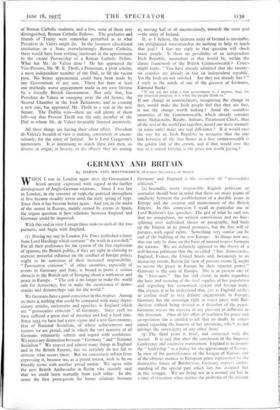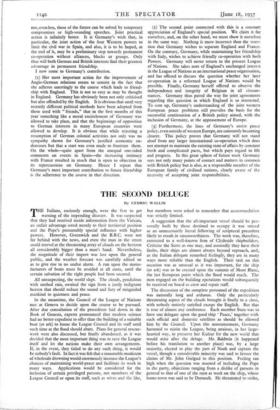GERMANY AND BRITAIN
By BARON VON RHEINBABEN (Former Secretary of State)
WHEN I was in London again after the Coronation I heard anxiety expressed with regard to the further development of Anglo-German relations. Since I was last in London, in the summer of 1936, the political atmosphere at first became steadily worse until the early spring of 1937. Since then it has become better again. And yet, in the midst of the unrest in Europe, mainly caused by events in Spain, the urgent question is how relations between England and Germany could be improved.
With this end in view I assign three tasks to each of the two partners, and begin with England.
(1) During my stay in London The Times published a letter from Lord Hardinge which contains " the truth in a nutshell." For all' their prefetence for the system of the free expression of opinion, the British public, if they are right in claiming to exercise powerful influence on the conduct of foreign policy, ought to be conscious of their increased responsibility. " Provocative criticism " of other countries, especially of events in Germany and Italy, is bound to prove a serious obstacle to the British task of bringing about a settlement and peace in Europe. " The task is no longer to make the world safe for democracy, but to make the coexistence of demo- cracies and dictatorships safe for the world."
We Germans have a good conscience in this respect. Among us there is nothing that could be compared with many depre- ciatory articles, caricatures and speeches in England which are " provocative criticism " of Germany. Since 1918 we have suffered a great deal of injustice and had a hard time. Since 1933 we have had a new regime and a new Government, that of National Socialism, of whose achievements and success we are proud, and to which the vast majority of all Germans voluntarily submit and regard with confidence. We reject any distinction between " Germany " and " National Socialism." We respect and admire many things in England and in the British Empire, but we certainly do not fail to criticise what occurs there. But we consciously refrain from expressing it, because we, as a proud nation, wish to be on friendly terms with another proud nation. We agree with the new British Ambassador in Berlin who recently said that we could learn mutually from each other. In this sense - the first prerequisite for better relations between Germany and England is the cessation of " provocative criticism."
(2) Secondly, every responsible English politician or journalist should bear in mind that there are many points of similarity between the establishment of a durable peace in Europe and the creation and maintenance of the British Empire. In this connexion I recall in particular one of Lord Baldwin's last speeches. The gist of what he said was that no compulsion, no written constitution and no hair- splitting over individual theses or paragraphs, had built up the Empire in its proud greatness, but the free will of partners with equal rights. Something very similar can be said of the building of the new Europe. As things now are, that can only be done on the basis of mutual respect between the nations. We are definitely opposed to the theory of a well-known politician that the so-called " free democracies, England, France, the United States and, fortunately to an increasing extent, Russia [in view of present events !], ought to secure the peace in Europe by their superior power." Germany is the core of Europe. She is at present one of the " have-nots." She has still claims to make regarding the basis and securing of the food supplies of her population and regarding her economical system and foreign trade. She expects it to be understood that, just as England wishes to confine itself to very definite engagements in Europe, Germany has the sovereign right to reject pacts with Bol- shevism without being decried as a disturber of the peace. Germany rejects the exercise of any pressure or influence in this direction. After all her offers of readiness for peace and co-operation she is entitled to ask that no doubt be enter- tained regarding the honesty of her intentions, which do not infringe the sovereignty of any other State.
(3) The third point is brief, and connected with the second. It is said that after the conclusion of the Imperial Conference and extensive rearmament England is to assume the " leadership " in a policy for the appeasement of Europe. In view of the powerlessness of the League of Nations and of the obvious menace to European peace represented by the destructive forces of Bolshevism, Germany expects under- standing of the special part which fate has assigned her in this struggle. We are living not in a normal era but in a time of transition when neither the problems of the present nor, even less, those of the future can be solved by temporary compromises or high-sounding speeches. Joint practical. action is infinitely better. It is Germany's wish that, in particular, the joint action of the four Western powers to limit the civil war in Spain, and also, it is to be hoped, at the end of it, may be a preliminary step towards permanent co-operation without alliances, blocks or groups. Only thus will both German and British interests find their greatest advantage in permanent friendship.
I now come to Germany's contribution.
(x) Her most important action for the improvement of Anglo-German relations seems to consist in the fact that she adheres unerringly to the course which leads to friend- ship with England. This is not so easy as may be thought in England. Germany has obviously been not only criticised but also offended by the English. It is obvious that until very recently different political methods have been adopted from those used with " friends," that in the first months of this year something like a moral encirclement of Germany was allowed to take place, and that the beginnings of opposition to German interests in many European countries were allowed to develop. It is obvious that while rejecting a resumption of German colonial activities not only was no sympathy shown for Germany's justified economic en- deavours but that a start was even made to frustrate them. On the whole—quite apart from the unequal one-sided comments on events in Spain—the increasing intimacy with France resulted in much that is open to objection in its repercussions on Germany. Hence I repeat that Germany's most important contribution to future friendship is the adherence' to the course in that direction. (2) The second point connected with this is a constant appreciation of England's speciil position. We claim it for ourselves, and, on the other hand, we must show it ourselves in the same way. Nothing is more incorrect than the asser= tion that Germany wishes to separate England and France: On the contrary, Germany, while maintaining her friendship with Italy, wishes to achieve friendly co-operation with both Powers. Germany will never return to the present League of Nations. She takes note of England's unchanged interest in the League of Nations as an international peace organisation, and has offered to discuss the question whether her later co-operation in a reformed League of Nations would be possible. Finally, Germany herself offered to observe the independence and integrity of Belgium in all circum- stances. Germany thus paved the way for joint agreements regarding this question in which England is so interested. To sum up, Germany's understanding of the joint western European peace problems still provides the basis for the successful continuation of a British policy aimed, with the inclusion of Germany, at the appeasement of Europe.
(3) Furthermore, the lines of Germany's entire peace policy, even outside of western Europe, are constantly becoming clearer. This policy proves that Germany will not stand aloof from any larger international co-operation which does not attempt to maintain the existing state of affairs by constant fresh and complicated pacts, but which pays regard to life and progress. In this great sphere of future work Germany sees not only many points of contact and matters in common with British policy but is also, as a responsible member of the European family of civilised nations, clearly aware of the necessity of accepting joint responsibilities.















































 Previous page
Previous page